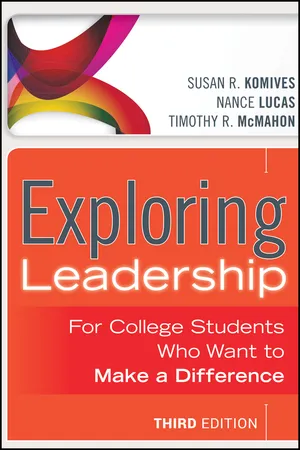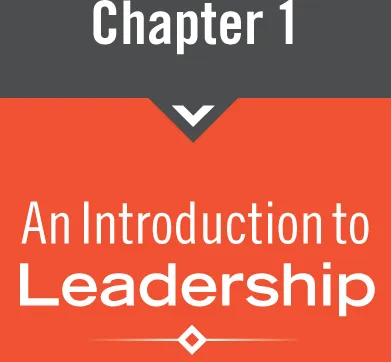![]()
More than ever, today's times demand that diverse people work flexibly and respectfully together. The chapters in this section establish a foundation for understanding how leadership has been perceived over time and how today's rapidly changing, networked world calls for new approaches to leadership. This section ends with exploration of a model of relational leadership and its elements of being purposeful, inclusive, ethical, and empowering. These four elements are embedded within an overall process orientation, which is the fifth component of the Relational Leadership Model.
The leadership process is not about things—it is about people. As you read this section, challenge yourself to think how it relates to you and to those you have worked with in groups or communities. Identify the strengths you bring to engage in this approach and try to see what new awareness or skill you might need to be more effective in working with others.
The writings of the Chinese philosopher Lao Tzu are wise guides to understanding yourself and others. In the book Tao of Leadership, Heider (1985) adapts Lao Tzu's proverbs. Lao Tzu advises us:
The model presented in this section promotes a relational process to leadership.
![]()
You will most likely find yourself—your interests and your attitudes—reflected on every page of this book, incorporating such characteristics as your age, gender, race, ethnicity, sexual orientation, generational status, social class, ability, or academic major. You can find ideas that apply to your interests whether you are majoring in engineering or English or are planning a career in journalism, agriculture, education, engineering, or law. Any number of other majors pertain to leadership as well.
Your habits are also reflected here. You might like details or you might only focus on the big picture. You might think best by speaking aloud or by turning thoughts over in your head before saying anything. However you work and think best, your perspective is distinctly yours and is represented in these pages.
Your unique experiences have shaped your view of yourself as a leader or member of a group. Think of the various leadership roles you have held or observed. Think about the various ways you have led formally, led informally, or been an active participant in various groups. Think about the leadership exhibited by the people you have admired or abhorred in the national or international news, in your home community, on campus, at work, or in the career field you are choosing. Think ahead to the places and relationships in which you could become more active—your classes, class projects, student employment position, residence hall, honor societies, student government, fraternity or sorority, athletic teams, alternative spring break program, study abroad experience, internship site, PTA meetings, your family, friendship groups, your off-campus work, community service settings, your church or temple—the possibilities are endless.
You draw on your personal characteristics, experiences, and the settings in which you might be involved for different leadership purposes. Some readers may want to further personal development; others may want to enhance a career skill, still others to accomplish social change. Whatever your purpose, your journey through the leadership process will make a difference in all aspects of your life.
Book Overview
As noted in the Preface, Exploring Leadership introduces you to the concepts of leader, follower, and leadership by embracing the philosophy that when engaging others in accomplishing change, everyone can be a leader. In Part One we describe the social construction of leadership over time and present a relational leadership model suitable for contemporary groups. Since the model is based in relationships, in Part Two we explore understanding yourself and others and the critical importance of ethical practices in your engagement with others. Appreciating and applying your strengths and those of others is the basis of those chapters. In Part Three we examine the team, group, and organizational contexts in which leadership is exhibited, using the perspective of those groups being viewed as communities. Part Four examines how leadership is critical to change and the importance of all involved thriving together as they engage each other in healthy, relational approaches.
Chapter Overview
In this chapter, we introduce key concepts and models that will be developed throughout the book, and we provide an overview of what we mean by leader, follower, and leadership. We show that new views on leadership are needed—views that call for ethical collaborations—and we describe ways to understand these new views. We assert our belief that leadership develops best when organizations and the individuals in them are open to learning together.
Foundational Principles
We encourage you to critique and analyze the perspectives and frames we present in this book. You will probably agree and connect with some ideas and disagree with others. But try to figure out why you agree or disagree. Go back and read the Preface if you did not already, to more fully understand the approach this book explores. Exercising critical thinking is a key to furthering your understanding about leadership. We encourage you to learn about leadership from different perspectives. To do that, you will need to identify the principles that are important to you and relate those beliefs to these perspectives. Also acknowledge those concepts and ideas that you disagree with and why. The foundational principles in this book are as follows:
1. Leadership is a concern of all of us. As individuals and groups, we have a responsibility to contribute effectively as members of organizations, local communities, nations, and in the world community. Members of communities (work, learning, living, and ideological communities) are citizens of those various groups and have a responsibility to develop shared leadership and participatory governance.
2. Leadership is viewed and valued differently by various disciplines and cultures; it is the critical question in each field. There are profound issues that need leadership in every field of study and every career. A multidisciplinary approach to leadership develops a shared understanding of differences and commonalities in leadership principles and practices across professions and cultures.
3. Conventional views of leadership have changed. Leadership is not static; it must be practiced flexibly. The rapid pace of change leads people to continually seek new ways of relating to shared problems.
4. Leadership can be exhibited in many ways. These ways of leading can be analyzed and adapted to varying situations. Different settings might call for different types of leadership. Pluralistic, empowering leadership values the inclusion of diverse people and diverse ideas, working toward common purposes.
5. Leadership qualities and skills can be learned and developed. Today's leaders are made, not born. Leadership effectiveness begins with self-awareness and self-understanding and grows to understanding of others. Identifying your core values and strengths and maximizing those in your leadership are key components in your leadership development.
6. Leadership committed to ethical action is needed to encourage change and social responsibility. Leadership happens through relationships among people engaged in change. As a relational process, leadership requires the highest possible standards of credibility, authenticity, integrity, and ethical conduct. Ethical leaders model positive behaviors that influence the actions of others.
Leadership development is greatly enhanced when you understand how important relationships are in leadership; that is, when you see the basic relational foundation of the leadership process. Three basic principles are involved:
- Knowing. You must know—yourself, how change occurs, and how and why others may view things differently than you do.
- Being. You must be—ethical, principled, authentic, open, caring, and inclusive.
- Doing. You must act—in socially responsible ways, consistently and congruently, as a participant in a community, and on your commitments and passions.
It is unrealistic to think that certain traditional leadership behaviors are required if you are to be an effective leader or collaborator in this time of rapid change. Leadership cannot be reduced to a number of easy steps. It is realistic, however, to develop a way of thinking—a personal philosophy of leadership—and identify core values that can help you work with others toward change. In today's complex times, we need a set of principles to guide our actions.
Rapidly Changing Times
At the current speed of change and with the complexity of today's problems, we can easily feel overwhelmed; we gasp for air as we navigate our fast-paced days with our many responsibilities. Your clock radio may awaken you to the news of protestors at US embassies somewhere in the world and the latest horrific crimes in your community. Your new system upgrade on your computer will not support some of your favorite programs. You go to class to learn something you hope you can apply to real life, but you find the material irrelevant. Just as you settle in to write a paper for class, one of your children falls and breaks her leg, changing your plans for days to come. You get to your job in the student activities office and find that the work you left unfinished yesterday is needed in fifteen minutes, instead of in two days as you had thought. You are troubled that student hazing, cheating, date rape, incivility, and other problems exist on campus. And the problems continue.
We no longer have simple problems with right and wrong answers but are increasingly faced with complex dilemmas and paradoxes. For example, we may want to be civil yet affirm freedom of speech, or we may want to find community and common purpose but also value individuality and individual differences.
Developing a personal approach to leadership that joins one person with others in an effort to accomplish a shared goal is difficult. It requires being intentional and thoughtful. A critical process to leading in rapidly changing, complex times is examining our own assumptions and realizing that others might see things differently. Gaining new insight means learning to identify and understand paradigms.
Understanding Paradigms
In every aspect of our lives, change is more rapid, confusing, and unpredictable than ever before. Daily newspapers bring awareness of complex local issues, and the nightly news flashes images of conflict at home and abroad. The conventional ways of thinking about and organizing our shared experiences do not seem helpful anymore. Instead of individual determinism, competition, and predictable structures, we seem to need quickly responding, nimble systems; collaboration; and a new awareness of shared values that honor our diversity.
These different perspectives might be called different worldviews, frames, or paradigms. Paradigms are patterns and ways of looking at things in order to make sense of them. Some paradigms are clear and help us function well. For example, you have fairly clear paradigms about playing baseball, going to class the first day, going to the airport, or attending the first meeting of an organization you wish to join. Consider going to that first class. You may sit in a preferred spot, expect to greet the person sitting beside you, get a syllabus, learn what text to buy, and perhaps even get out a bit early. That paradigm might be shattered if you arrived to find no chairs, or a professor who said, “I have not yet organized this class. What do you want to learn?” It is hard then to figure out what will happen; the rules no longer work; your established paradigms do not help fill in the gaps. Indeed, you might judge this class t...












